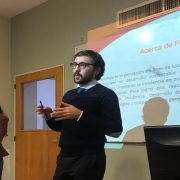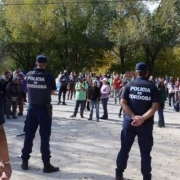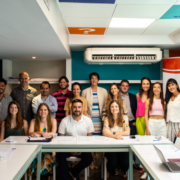Bajo Grande and Jerónimo de la Gente: A prize that seeks to cover a problem of years?
On April 6, the award ‘Jerónimo de la Gente’ was presented in the city of Córdoba and it was the Civil Association ‘Las Omas’, who won the first place after the vote. The recognition seeks to distinguish a citizen, citizen, or grouping of citizenship; whose work in Córdoba seeks in some way to address social problems.
“Below, we offer a google translate version of the original article in Spanish. This translation may not be accurate but serves as a general presentation of the article. For more accurate information, please switch to the Spanish version of the website. In addition, feel free to directly contact in English the person mentioned at the bottom of this article with regards to this topic”.
Las Omas, an organization established in the Chacras de la Merced neighborhood, since 2011 has been dedicated to the assistance of neighbors living in poverty and violence. At the same time, its president, Alida Weht, has been the one who has taken the bastion of the fight against pollution caused by the malfunction of the Sewage Treatment Plant of Córdoba.
The prize that Las Omas received is a distinction for their tireless work to improve the situation of women in the neighborhood, but little has been mentioned in the media about their immense work, to improve and protect the environment that surrounds them. Mayor Mestre has recognized Las Omas on the one hand, but on the other, he has not done anything to help them end the problems derived from pollution.
A few weeks ago, it became known that the Municipality of Córdoba admitted that the plant is not in perfect condition and that it is operating at 60%. Likewise, Daniel Bardagi, Director of Sanitary and Gas Networks, promised that in the next few days the plant would be fully operational.
This position of the Municipality collides directly with what is expressed by the employees who are working in the WWTP, and who have declared that the plant under no circumstances is able to operate at 100%. In addition, they have declared that the liquid that enters the station is not treated in any way and the conditions in which it enters are the same that it has when it is dumped into the Suquía River.
These comings and goings between the Municipality and employees of the plant, are not new and do nothing but dilate a situation that has long been unsustainable. The lack of responsibility of the municipal government and the desire to hide a reality that is visible so many years ago, has become a community of people who today are in a situation of extreme vulnerability.
Similarly, the problem of pollution is not only limited to the area of the city of Córdoba. It has been verified that the unloadings in crude have arrived at least and safely to Capilla de los Remedios. Moreover, the samples taken and evaluated by the National University of Córdoba (UNC) show that the bacteria and coliforms present in the water 36 km from Bajo Grande, are in practically the same amounts and concentration as when they leave plant. Also, there may be evidence that contamination has reached the mouth of the Primero River in the Laguna de Mar Chiquita.
Derived from this contamination, neighbors of Chacras must face every day a myriad of problems, most of which are related to health (skin, respiratory and gastrointestinal diseases). Similarly, the environment vitiated by the smell of cloacal water overturned raw, makes life more difficult in that place.
From the Municipality of Córdoba has been announced that in the coming days and weeks will be bidding three refurbishment works in the plant for almost 300 million pesos. These spare parts correspond to the failure of the mitigation plans assumed each year by the successive municipal administrations. According to Federico Kopta, of the Córdoba Environmental Forum, these spare parts and the expansion of the plant that is in progress will not be able to reverse or mitigate the current contamination situation, as long as the necessary controls on the sewage network are not carried out.
After years of claims, we have again asked the authorities to recognize the problem and take action on the matter. The situation of vulnerability that lives in the community located next to the purification station is, today, unsustainable and degrading. The Jerónimo de la Gente award, has managed to recognize the tireless work of Las Omas, but has not been able to cover a problem that they must face each and every one of their days. After this award, there should be a commitment of officials to families in that area and the environment of all inhabitants of the province of Cordoba.
Sources
- From Rio to Cloaca
- Pollution from sewers reaches Mar Chiquita
- Jerónimo de la Gente: Mestre announced the winner
- A woman who knows that she can do everything
- The Municipality Recognizes that Bajo Grande works poorly
- The Highlighter: The Low Big Plant wrapped in controversies
- Bajo Grande: Bajo Grande: $ 330 million for its total refunctionalization
Contact
María Pérez Alsina – mariaperezalsina@fundeps.org
Agustina Palencia – agustinapalencia@fundeps.org






